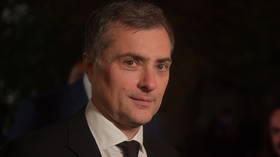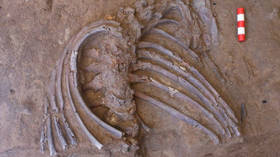End of an era as Surkov leaves Kremlin: Will it signal new dawn between Russia & Ukraine?

So it's official now. A month after it was first leaked, the Kremlin has confirmed that Vladislav Surkov has left the building. There are divergent views on his legacy, but nobody will accuse him of being boring.
It was the age of big beast political advisers. George W Bush looked to Karl Rove, Tony Blair relied on Alastair Campbell and Vladimir Putin had Vladislav Surkov.
In Washington, Rove reflected a post-Cold War American exuberance ("we're an empire now, and when we act, we create our own reality"), while Campbell kept his boss on a tight leash, reportedly once interrupting Blair's answer to a question on religion with the words "we don't do God."
Surkov was a far more complex character, with something of the night about him. Presented in foreign media as if he were Beezlebub, the divine messenger and the infinite spirit all rolled into one.
Dubbed the Kremlin's 'gray cardinal,' he maintained a mystique which both beguiled and confused. There were occasional statements, but the grand vision was never explained. Until, towards the end, when he presented a meandering essay, which was lapped up by the slobbering sycophants who constituted his anglophone fan club.
In this promulgation, Surkov claimed Russia was "playing with the West's minds," adding that "we need to recognize, understand and describe the Putinist system of government … as the ideology of the future." Surkov, of course, was never shy about laying claim to his own role in the development of the dogma at hand.
The éminence grise construct worked especially well with western journalists and writers, who devoured the bait and painted him in various cimmerian shades. "He is an aesthete who pens essays on modern art, an aficionado of gangsta rap who keeps a photo of Tupac on his desk next to that of the president,"read one example of retching flattery.
Also on rt.com Long-time Putin aide Vladislav Surkov leaving Kremlin ‘over Ukraine course shift,’ reports claimThe same British lobbyist even managed to deliver a book on the theme, one presented as fact, but soon exposed as having more in common with fiction.
So, while there was a kind of Surkov 'cottage industry' in the West, Russians were somewhat less gullible and credulous. A few years ago, at a Sochi cafe, I noticed some photos of Surkov on the walls, looking rather jolly. The waitress explained that he visited frequently and was a "very nice man, and very down to earth." That description certainly didn't fit with the US/UK media portrayal, where Surkov was rendered as Putin's Rasputin.
Meanwhile, in reality, he may have been merely a self-promoting apparatchik, tricking observers into confusing ballyhoo and hoopla with a lofty intellectual veneer. We probably got our answer this week, when the Kremlin seemed to make a point of announcing his dismissal. Surkov, it seems, ran out of road.
In Putin's first two terms, he was chief conductor of the political orchestra, 'inventing' a concept of governance he dubbed 'sovereign democracy.' This was defined, by Surkov himself, as describing "a society's political life where the political powers, their authorities and decisions are decided and controlled by a diverse Russian nation for the purpose of reaching material welfare, freedom and fairness by all citizens, social groups and nationalities, by the people that formed it."
His Machiavellian machinations included the promotion of "Nashi" (Ours), a patriotic anti-liberal and anti-facist youth movement designed to ward off mishaps like the US-backed 'color revolutions' in neighboring Georgia and Ukraine, which invoked unfortunate memories of the Soviet-era Komsomol.
The weakness of Surkov's puppeteering was that it created an 'us and them' mentality, which helped feed the 2011/12 Moscow protests that threatened to destabilize Russia. Inspired by parliamentary election irregularities, it spiraled into a standoff about the state's future direction. Even people who had done well out of the Putin system, such as famous TV hosts Vladimir Posner and Ksenia Sobchak, joined the side of the protestors. More remarkably again, Alexey Kudrin, a personal friend of the President turned up to speak at a rally.
When things calmed down, Surkov was effectively sidelined, with the more conventional Sergey Kirienko de facto assuming his strategist role on the domestic scene. Later, Surkov began a political second act as the Kremlin's 'point man' on difficult 'near abroad' issues, such as Abkhazia, South Ossetia and Ukraine.
Also on rt.com Surkov & Bogdan out: Russia & Ukraine announce new negotiators as relations slowly thawIn Kiev, he was seen as a hardliner and his exit has been greeted as a positive step. Notably, Ukraine also changed his de facto opposite number last week, when Andriy Yermak came in for Andriy Bogdan. Some, including Echo of Moscow editor-in-chief Alexey Venediktov, speculated the two moves were related, and a signal both governments want to make progress on ending the almost six-year-old conflict in eastern Ukraine.
Indeed, Surkov's close associate Alexey Chesnakov, said his friend's departure was "in connection with the change of course in (Kremlin) policy towards Ukraine."
Now, Dmitry Kozak, who is himself Ukrainian, takes over. Hailing from the Kirovograd region, in the center of the country, the 61-year-old moved to Saint Petersburg after attending college in Vinnitsa. It was there he met Vladimir Putin, when both of them worked in the office of Anatoly Sobchak, the city's mayor during the turbulent early 1990s.
When Putin moved to Moscow, Kozak followed, and over the past two decades, he's specialized as a negotiator and 'fixer' for problems around the old Soviet Union, most notably in Moldova
Kozak will be viewed as a friendlier face in Kiev, and more amenable to Ukrainian concerns. The conditions are now in place to resolve the six-year stand-off between Ukraine and the Donbass separatists, who are backed by Moscow.
Meanwhile, Surkov steps back into the shadows. Don't bet on him staying there, however. There's surely another act, or two, to come.
Think your friends would be interested? Share this story!
The statements, views and opinions expressed in this column are solely those of the author and do not necessarily represent those of RT.














